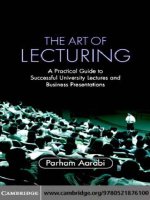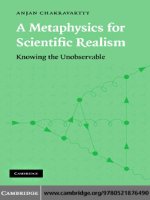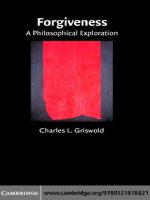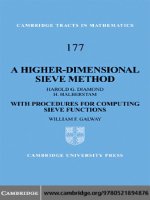0521837847 cambridge university press common sense a contemporary defense aug 2004
Bạn đang xem bản rút gọn của tài liệu. Xem và tải ngay bản đầy đủ của tài liệu tại đây (984 KB, 210 trang )
P1: JZW/KJS
P2: IWV
Aggregation-FM.xml
CY402/Lemos
0521837847
May 17, 2004
This page intentionally left blank
ii
23:55
P1: JZW/KJS
P2: IWV
Aggregation-FM.xml
CY402/Lemos
0521837847
May 17, 2004
23:55
Common Sense
In Common Sense, Noah Lemos presents a strong defense of the common
sense tradition, the view that we may take as data for philosophical inquiry
many of the things we ordinarily think we know. Lemos discusses the main
features of that tradition as expounded by Thomas Reid, G. E. Moore,
and Roderick Chisholm.
For a long time, common sense philosophers have been subject to two
main objections: that they fail to give any non-circular argument for the
reliability of memory and perception, and that they pick out instances of
knowledge without knowing a criterion for knowledge. Lemos defends
the appeal to what we ordinarily think we know in both epistemology
and ethics, and thus rejects the charge that common sense is dogmatic,
unphilosophical, or viciously question-begging.
Written in a clear and engaging style, Common Sense will appeal to
students and philosophers in epistemology and ethics.
Noah Lemos is Professor of Philosophy at DePauw University.
i
P1: JZW/KJS
P2: IWV
Aggregation-FM.xml
CY402/Lemos
0521837847
ii
May 17, 2004
23:55
P1: JZW/KJS
P2: IWV
Aggregation-FM.xml
CY402/Lemos
0521837847
May 17, 2004
23:55
cambridge studies in philosophy
General editor ernest sosa (Brown University)
Advisory editors:
jonathan dancy (University of Reading)
john haldane (University of St. Andrews)
gilbert harman (Princeton University)
frank jackson (Australian National University)
william g. lycan (University of North Carolina at Chapel Hill)
sydney shoemaker (Cornell University)
judith j. thomson (Massachusetts Institute of Technology)
recent titles
d. m. armstrong A World of States of Affairs
pierre jacob What Minds Can Do
andre gallois The World Without, the Mind Within
fred feldman Utilitarianism, Hedonism, and Desert
laurence bonjour In Defense of Pure Reason
david lewis Papers in Philosophical Logic
wayne davis Implicature
david cockburn Other Times
david lewis Papers on Metaphysics and Epistemology
raymond martin Self-Concern
annette barnes Seeing Through Self-Deception
michael bratman Faces of Intention
amie thomasson Fiction and Metaphysics
david lewis Papers on Ethics and Social Philosophy
fred dretske Perception, Knowledge, and Belief
lynne rudder baker Persons and Bodies
john greco Putting Skeptics in Their Place
derk pereboom Living Without Free Will
brian ellis Scientific Essentialism
julia driver Uneasy Virtue
alan h. goldman Practical Rules: When We Need Them and When We Don’t
ishtiyaque haji Deontic Morality and Control
andrew newman The Correspondence Theory of Truth
jane heal Mind, Reason, and Imagination
peter railton Facts, Values, and Norms
christopher s. hill Thought and World
wayne davis Meaning, Expression, and Thought
andrew melnyk A Physicalist Manifesto
jonathan l. kvanvig The Value of Knowledge and the Pursuit of Understanding
william s. robinson Understanding Phenomenal Consciousness
iii
P1: JZW/KJS
P2: IWV
Aggregation-FM.xml
CY402/Lemos
0521837847
May 17, 2004
For my wife, Lisa
iv
23:55
P1: JZW/KJS
P2: IWV
Aggregation-FM.xml
CY402/Lemos
0521837847
May 17, 2004
Common Sense
A Contemporary Defense
NOAH LEMOS
DePauw University
v
23:55
cambridge university press
Cambridge, New York, Melbourne, Madrid, Cape Town, Singapore, São Paulo
Cambridge University Press
The Edinburgh Building, Cambridge cb2 2ru, UK
Published in the United States of America by Cambridge University Press, New York
www.cambridge.org
Information on this title: www.cambridge.org/9780521837842
© Noah Lemos 2004
This publication is in copyright. Subject to statutory exception and to the provision of
relevant collective licensing agreements, no reproduction of any part may take place
without the written permission of Cambridge University Press.
First published in print format 2004
isbn-13
isbn-10
978-0-511-21197-3 eBook (EBL)
0-511-21374-3 eBook (EBL)
isbn-13
isbn-10
978-0-521-83784-2 hardback
0-521-83784-7 hardback
Cambridge University Press has no responsibility for the persistence or accuracy of urls
for external or third-party internet websites referred to in this publication, and does not
guarantee that any content on such websites is, or will remain, accurate or appropriate.
P1: JZW/KJS
P2: IWV
Aggregation-FM.xml
CY402/Lemos
0521837847
May 17, 2004
23:55
Contents
Acknowledgments
Preface
page ix
xi
1 The Common Sense Tradition
1.1 Some Main Features of the Common Sense Tradition
1.2 Evidence or Irresistibility?
1
2
13
2 Common Sense and Reliability I
2.1 Two Assumptions
2.2 The Problem of Circularity: Alston and Sosa
24
24
36
3 Common Sense and Reliability II
3.1 Fumerton’s Objections
3.2 Vogel, Roxanne, and the Neo-Moorean Argument
3.3 Further Reflections and Reflective Knowers
48
48
53
60
4 Reid, Reliability, and Reid’s Wrong Turn
4.1 Reid on Our Knowledge of the Reliability
of Our Faculties
4.2 Reid’s Wrong Turn
67
5 Moore, Skepticism, and the External World
5.1 Moore’s Proof and the Charge of Question-Begging
5.2 Moore’s Response to Skepticism and Stroud’s
Objection
5.3 The Sensitivity Requirement and the Contextualist
Criticism
vii
67
76
85
85
91
96
P1: JZW/KJS
P2: IWV
Aggregation-FM.xml
CY402/Lemos
0521837847
May 17, 2004
23:55
6 Chisholm, Particularism, and Methodism
6.1 Chisholm and the Problem of the Criterion
6.2 What’s Wrong with Methodism?
6.3 Supervenience and Particular Epistemic Beliefs
6.4 Moser’s Criticism of Particularism
6.5 BonJour’s Criticism of Particularism
6.6 Butchvarov’s Objection
105
106
111
116
122
128
132
7 Common Sense and A Priori Epistemology
7.1 Chisholm on Epistemic Principles and
A Priori Knowledge
7.2 Modest A Priori Knowledge
7.3 Lycan’s Defense of the Moorean Response
to Skepticism
7.4 Modest A Priori Knowledge and Common
Sense Particularism
135
8 Particularism, Ethical Skepticism, and Moral Philosophy
8.1 Some Criticisms of Wide Reflective Equilibrium
and Particularism
8.2 Justified Belief About Particular Actions Reconsidered
157
136
144
150
152
162
170
Conclusion
181
Selected Bibliography
Index
183
187
viii
P1: JZW/KJS
P2: IWV
Aggregation-FM.xml
CY402/Lemos
0521837847
May 17, 2004
23:55
Acknowledgments
I am deeply grateful to several people who have been kind enough to read
all or large parts of the manuscript. These include Michael Bergmann,
Fred Feldman, Dan Parks, Matthias Steup, and Erik Wielenberg.
I have also benefited over the years from discussions with my colleagues
at DePauw University concerning the issues taken up in this book, most
especially Marthe Chandler, Marcia McKelligan, and Roger Gustavsson.
I would like to thank DePauw University and John and Janice Fisher for
their support through Faculty and Fisher Fellowships. Though it has been
more than twenty years since I sat in their classrooms, I remain deeply
grateful to my teachers, Roderick Chisholm, who introduced me to the
works of Thomas Reid; James Van Cleve, who gave me a deeper understanding of Reid; and, most especially, Ernest Sosa, whose influence is
evident throughout this book.
To my father, Ramon Lemos, who has read all that I’ve sent him, I
owe a debt that I can never repay.
Finally, I wish to thank my wife Lisa, to whom this book is dedicated.
ix
P1: JZW/KJS
P2: IWV
Aggregation-FM.xml
CY402/Lemos
0521837847
x
May 17, 2004
23:55
P1: JZW/KJS
P2: IWV
Aggregation-FM.xml
CY402/Lemos
0521837847
May 17, 2004
23:55
Preface
Often showing only a polite interest in what I do, non-philosophers occasionally ask what I’ve been up to. I tell them that I’ve been working on a
book on the common sense tradition in philosophy. Often I get a response
like this: “Common sense?! What’s that got to do with philosophy?” This
response is (one hopes) a good-natured jab at philosophy and philosophers.
Those who make it do know a little bit about philosophy. Many of them
have read Hume or Berkeley or, at least, have some rough idea of their
views. They know that some famous philosophers have said some pretty
strange things that seem to contradict common sense. So they assume
philosophy is just opposed to common sense. That seems to be, in my
experience, a popular view of philosophy. Those who make these jabs are
often unaware that there is another view of the matter. Thomas Reid, the
Scottish contemporary and critic of Hume, wrote, “Philosophy . . . has no
other root but the principles of Common Sense; it grows out of them,
and draws its nourishment from them. Severed from this root, its honours
wither, its sap is dried up, it dies and rots.”1
Reid, who sought to reconcile philosophy with the principles of
common sense, stands as one of the major figures in the common sense
tradition. If the popular mind is largely ignorant of the common sense
tradition, the same is not true of the philosophical community. Among
philosophers, the common sense tradition has not been, to put it mildly,
universally endorsed. Many very good philosophers have rejected various aspects of the common sense tradition as being “unphilosophical,”
“dogmatic,” “question-begging,” or “intemperate.” Sometimes these
1 Thomas Reid, Inquiry and Essays, edited by Ronald E. Beanblossom and Keith Lehrer
(Indianapolis: Hackett, 1983), p. 7.
xi
P1: JZW/KJS
P2: IWV
Aggregation-FM.xml
CY402/Lemos
0521837847
May 17, 2004
23:55
charges are made quickly within the first few pages of philosophical works,
and very little more is said in support of them. It is as though the author
assumes that the reader can readily see for himself the philosophical inadequacy of the approach of the common sense tradition. In other cases,
however, these charges are often based on well-considered philosophical
views about the nature of knowledge and justification. So, for these critics,
the popular jibe “What’s common sense got to do with philosophy?” may
be raised as a serious philosophical question, one that calls for the common sense tradition and its assumptions to be examined philosophically
and critically.
In this book, I discuss the views of some of the main figures in that
tradition – namely, Thomas Reid, G. E. Moore, and Roderick Chisholm.
My approach will be philosophical and conceptual, rather than historical.
I will discuss some of the views of each thinker, views that I think are
characteristic of, or important to understanding, the common sense tradition. I also discuss some recent criticisms of these views. In this way, I
hope, we might be better able to appreciate the common sense tradition
from a contemporary perspective, one that takes into account contemporary views about relevant philosophical matters, such as recent views on
the nature of knowledge and justification. I will, for the most part, defend
the views of Reid, Moore, and Chisholm. I will be satisfied if the reader
at least comes away with the view that the common sense tradition is not
unphilosophical, dogmatic, intemperate, or viciously question-begging.
In Chapter 1, I present some of the main features of the common sense
tradition. I lay out some views characteristic of the tradition and some
views to which it is not committed. One view common to members of
the tradition is, roughly, that we may take as data for philosophical inquiry
many of the things we ordinarily think we know. This is no doubt part of
what Reid means in claiming that philosophy is rooted in common sense.
Among the things we ordinarily think we know are various “common
sense” propositions such as that there are other people, that they think
and feel and have bodies. But why should we take these propositions as
data? Members of the common sense tradition have given different sorts of
answers, and some of them do not seem very compelling. Some members
of the tradition, Reid for example, hold that we may take such propositions
as data because we simply cannot give them up. On this view, we may take
certain claims as data for philosophical inquiry because we cannot give
them up, because we find them doxastically compelling. An alternative
answer, and one more central to the common sense tradition, is that
these are things that we do know or that we are justified in believing. In
xii
P1: JZW/KJS
P2: IWV
Aggregation-FM.xml
CY402/Lemos
0521837847
May 17, 2004
23:55
other words, we may take these things as data because they enjoy some
positive epistemic status. But this sort of answer leaves the common sense
philosopher open to a variety of objections. Two of the most important
are the following. First, we cannot pick out instances of knowledge or
justified belief without first knowing a criterion of knowledge. Since the
common sense philosophers do not offer us one, their claims to know the
epistemic propositions they take as data are false. Second, the beliefs that
the common sense philosopher takes as data are instances of knowledge
only if those beliefs are reliably formed. But the only satisfactory way
to know that those beliefs are reliably formed is on the basis of some
“non-circular” argument. Yet philosophers in the common sense tradition
simply haven’t provided the necessary argument. So they have no reason
to think that the beliefs they take as data are reliably formed. Much of
this book explores what the common sense tradition has said or should
say in response to these objections. In Chapters 2 and 3, I will focus
primarily on the second objection. In Chapter 6, I will focus on the
first.
In Chapter 2, I take up the second objection. I consider some reasons
in favor of the view that perceptual and mnemonic knowledge require
that one know or be justified in believing that one’s perception and memory are reliable. I argue that we should reject such a requirement, in part
because it would preclude children and brute animals from having perceptual and mnemonic knowledge. But even if we reject the requirement,
I argue that we cannot simply ignore the question of the reliability of our
ways of forming beliefs. Does knowledge of the reliability of our ways
of forming beliefs really require the sort of non-circular argument that
the critic demands? I examine how William Alston and Ernest Sosa answer this question. I will also look at “track record” and “Neo-Moorean”
arguments for the reliability of our doxastic sources. Following Sosa, I
will hold that knowledge of the reliability of one’s way of forming beliefs simply doesn’t require the sort of non-circular argument the critic
demands.
In Chapter 3, I continue the discussion of the issues raised in Chapter 2,
examining some criticisms of the view defended by Sosa. I will explore
some objections to this view raised by Richard Fumerton and Jonathan
Vogel and argue that they do not show that the only way to know that
one’s ways of forming reliable beliefs is on the basis of a non-circular
argument. I will argue that even if we accept the view that a reflective being knows that p only if he is justified in believing that his belief that p is reliably formed, this does not imply that we must reject
xiii
P1: JZW/KJS
P2: IWV
Aggregation-FM.xml
CY402/Lemos
0521837847
May 17, 2004
23:55
track-record arguments or the Neo-Moorean argument for the reliability
of perception and memory.
In Chapter 4, I look at the views of Thomas Reid concerning our
knowledge of the reliability of our ways of forming beliefs. Reid holds
that it is a “first principle” that our natural cognitive faculties are reliable.
In addition, he seems to endorse some ways in which the reliability of
our faculties can be supported. Reid seems to hold the view that we can
know on the basis of our natural faculties that they are in fact reliable. Yet
Reid also seems to criticize Descartes’s attempts to defend the reliability of
his faculties as “question-begging,” and some of the criticisms that Reid
makes of Descartes would seem no less applicable to Reid’s own views. I
will argue, however, that Reid’s criticism of Descartes is mistaken, that it
is a wrong turn on his part.
In Chapter 5, I begin by looking at Moore’s proof of an external world
and his response to skepticism. It is sometimes charged that philosophers
in the common sense tradition do not take skepticism seriously. Well,
certainly they aren’t skeptics, but they do address and consider skeptical
arguments, though many critics think their responses unsatisfactory. In
the first section, I look at Moore’s proof for an external world and defend
it against the charge that it is “question-begging.” In the second section,
I consider a Moorean response to skepticism and defend it against a criticism raised by Barry Stroud. The third section focuses on the “sensitivity
requirement” prominent in recent “relevant alternative” and “contextualist” criticisms of Moore’s views.
In Chapter 6, I return to the objection that picking out particular
instances of knowledge or justified belief depends upon knowing some
general criterion of knowledge or justified belief. I begin with Chisholm’s
discussion of particularism, methodism, and skepticism. Chisholm defends
particularism against methodism and skepticism. Methodism holds that in
order to pick out instances of knowledge or justified belief, one has to
know a criterion of knowledge or justification. Particularism denies this.
I believe that Chisholm is right and the methodists are wrong. I look at
one attempt to support methodism by appealing to the “supervenient”
character of evaluative concepts such as knowledge and justification. I
also look at some criticisms of common sense particularism raised by Paul
Moser, Laurence BonJour, and Panayot Butchvarov.
Chapter 7 addresses the relationship between a priori knowledge and
common sense particularism. On “strong” accounts of a priori knowledge
and justification, such as Chisholm’s, basic a priori knowledge is certain
and indefeasible. What enjoys basic a priori justification is thus “insulated”
xiv
P1: JZW/KJS
P2: IWV
Aggregation-FM.xml
CY402/Lemos
0521837847
May 17, 2004
23:55
from defeat by conflict with our common sense beliefs. This presents
a problem for the common sense particularist who holds both that some
epistemic principles are justified a priori and that our common sense beliefs
can defeat various epistemic principles. Moreover, the strong account
makes it very unlikely that many, if any, interesting epistemic principles
can be known or justified a priori. Some philosophers might welcome
such a view. William Lycan, for example, defends a Moorean response to
skepticism by calling into question the epistemic credentials of alleged a
priori intuitions. I defend a “modest” view of a priori knowledge and justification, one that does not require that basic a priori knowledge be certain
and indefeasible. Such a view leaves open the possibility of a priori justification for epistemic principles, including those in skeptical arguments,
while also leaving open the possibility of defeat by other considerations.
In Chapter 8, I look at some recent views on the role that our moral
judgments should play in moral philosophy. If the common sense tradition holds that we may take as data much that we ordinarily think we
know in formulating criteria of knowledge and evidence, then may we
do the same when we attempt to formulate criteria of right action? I think
the answer is “yes.” Particularists in epistemology hold that we can pick
out particular instances of knowledge and justified belief. Particularists
in moral philosophy assume that we can pick out particular instances of
right and wrong action, that we can know that some particular actions
are right and others wrong. Several philosophers have taken the opposing
view, and hold that in attempting to formulate criteria of right action, we
should not rely upon our moral judgments or “intuitions” about what
is right or wrong. In some cases, this opposition is rooted in arguments
similar to those raised against particularism and the common sense tradition in epistemology. I argue that these objections fare no better when
they are raised in moral philosophy. In other cases, however, the opposition to particularism in moral philosophy does not rest on such grounds.
Some philosophers, who endorse a form of act utilitarianism, have suggested that we simply cannot know whether particular actions are right
or wrong. They hold that we simply cannot pick out particular instances
of right and wrong action. Such a view seems to be held, surprisingly
perhaps, by Moore. I look critically at such views.
Finally, let me make two cautionary points. First, much of the discussion in this book concerns epistemology and what we may assume when
we try to answer the epistemological questions that concern us. However,
I don’t give any detailed analysis of the nature of knowledge or criteria for
knowledge and justified belief. I leave many substantive epistemological
xv
P1: JZW/KJS
P2: IWV
Aggregation-FM.xml
CY402/Lemos
0521837847
May 17, 2004
23:55
questions unanswered. So, for example, I take the common sense tradition to hold that perception and memory are sources of knowledge and
justified belief. If, as Reid says, philosophy is rooted in common sense,
then a satisfactory epistemological theory should be adequate to the view
that we do have perceptual and mnemonic knowledge. Yet I do not offer
a detailed account of how we have perceptual and mnemonic knowledge.
Indeed, even among the members of the common sense tradition there
are differences about how we have such knowledge. There are differences,
for example, among Reid, Moore, and Chisholm on the nature of perception. So, while a variety of different answers could be offered from
within the common sense tradition about the nature of perceptual and
mnemonic knowledge, I defend the common sense tradition in a way that
does not rule out various possibilities and live options.
Second, I explicate and defend some of the main views of the common
sense tradition. There will be no neat original proofs of the existence of
external objects or other minds, so the reader is warned not to look for
any. Of course, such proofs are, from the standpoint of the common sense
tradition, unnecessary for knowledge of such things. Instead, I aim at the
more modest goal of defending the view of the common sense tradition
that we do know many of the things we ordinarily take ourselves to
know and that it is reasonable for us to assume as much in the course of
philosophical, epistemological, and moral inquiry.
xvi
P1: KcS
0521837847c01.xml
CY402/Lemos
0521837847
May 4, 2004
1:10
1
The Common Sense Tradition
In this chapter, I begin by describing some of the main features of the common sense tradition, whose chief representatives include Thomas Reid,
G. E. Moore, and Roderick Chisholm. There are certainly important
differences among the views of Reid, Moore, and Chisholm, but I think
one can give a rough account of some central features of the common
sense tradition. In the first section, I describe some of the main views
accepted by members of the tradition as well as some views to which
they are not committed. In the second section, I consider some views
about why we should take various common sense propositions as data for
assessing philosophical theories. Philosophers in the common sense tradition have offered different sorts of answers to this question. Sometimes
they suggest that we simply have no alternative to taking these propositions as data. Sometimes, however, it is suggested that such propositions
are “irresistible” – that we cannot give up our belief in them. Reid, for
example, appears in places to take this view. In other cases, they point,
not to irresistibility, but to the positive epistemic character of our beliefs
in such propositions as that which makes them worthy of being taken as
data. On this view, it is the fact that we know or are justified in believing
certain propositions that makes them worthy of being taken as data. This
“epistemic answer” seems to me to be the best. However, appealing to
the epistemic character of various common sense beliefs invites a variety of objections and criticisms that we shall consider in various forms
throughout this book.
1
P1: KcS
0521837847c01.xml
CY402/Lemos
0521837847
May 4, 2004
1:10
1.1 SOME MAIN FEATURES OF THE COMMON
SENSE TRADITION
Roderick Chisholm, along with Thomas Reid and G. E. Moore, is
one of the most prominent defenders of the common sense tradition
in philosophy. Chisholm once wrote that in investigating the theory of
knowledge from a philosophical or “Socratic” point of view,
We presuppose, first, that there is something that we know and we adopt the
working hypothesis that what we know is pretty much that which on reflection
we think we know. This may seem like the wrong place to start. But where else
could we start?1
Elsewhere, we find Chisholm saying:
It is characteristic of “commonsensism,” as an alternative philosophical tradition,
to assume that we do know, pretty much, those things we think we know, and
then having identified this knowledge, to trace it back to its sources and formulate
criteria that will set it off from those things we do not know.2
Chisholm held that we can pick out instances of knowledge and reasonable belief and use them as “data” for formulating and assessing criteria of
knowledge and evidence. He held, roughly, that our criteria of knowledge
and evidence should fit or cohere with what we take ourselves to know or
to be justified in believing. If some proposed criterion of knowledge implies that we do not know many of the things we ordinarily take ourselves
to know – for example, that there are other people and they have bodies –
then so much the worse for that proposed criterion. Our philosophical
theory of knowledge, our criteria of knowledge and evidence should be,
in his view, adequate to the fact that we do know such things.
Chisholm saw himself as belonging to the common sense tradition,
a tradition that includes the eighteenth-century Scottish philosopher
Thomas Reid and the influential English philosopher, G. E. Moore. Reid
was a contemporary and critic of that better known Scottish philosopher,
David Hume. It is Hume who gets credit for awakening Immanuel Kant
from his “dogmatic slumbers,” but it is Reid who gets things more nearly
right, or so think Chisholm and the other commonsensists. Hume belonged to the great tradition of British Empiricism that included John
1 Roderick M. Chisholm, Theory of Knowledge, 2nd edition (Englewood Cliffs, N. J.: Prentice
Hall, Inc., 1977), p. 16.
2 Roderick M. Chisholm, The Foundations of Knowledge (Minneapolis: The University of
Minnesota Press, 1982), p. 113.
2
P1: KcS
0521837847c01.xml
CY402/Lemos
0521837847
May 4, 2004
1:10
Locke and Bishop Berkeley. But it was the intrepid Hume who, to
many, including Reid, drew out the implications of British Empiricism.
Reid took Hume to have shown that empiricism implies that we have
no knowledge of the material world; no knowledge of the future, the
past, other minds; nor, indeed, any knowledge of ourselves as continuing subjects of consciousness. Reid took Hume to have shown that
the wages of empiricism are a rather thoroughgoing skepticism. Reid
writes:
A traveller of good judgment may mistake his way, and be unawares led into
a wrong track; and while the road is fair before him, he may go on without
suspicion and be followed by others but, when it ends in a coal pit, it requires
no great judgments to know he hath gone wrong, nor perhaps to find out what
misled him.3
According to Reid, since we do know many things of the sort that empiricism would rule out, so much the worse for empiricism. Since the
theory implies that we do not know things we do know, we should reject
the theory. A similar stance was taken by Moore. Concerning skeptical
arguments in general, Moore writes:
But it seems to me a sufficient refutation of such views as these, simply to point
to cases in which we do know such things. This, after all, you know, really is a
finger; there is no doubt about it: I know it, and you all know it. And I think we
may safely challenge any philosopher to bring forward any argument in favour
either of the proposition that we do not know it, or of the proposition that
it is not true, which does not at some point rest upon some premiss which is
beyond comparison, less certain, than the proposition which it is designed to
attack.4
Elsewhere, Moore writes:
There is no reason why we should not, in this respect, make our philosophical
opinions agree with what we necessarily believe at other times. There is no
reason why I should not confidently assert that I do really know some external
facts, although I cannot prove the assertion except by simply assuming that I do.
I am, in fact, as certain of this as of anything; and as reasonably certain of it.5
3 Thomas Reid, Inquiry and Essays, ed. Ronald E. Beanblossom and Keith Lehrer (Indianapolis:
Hackett, 1983), p. 11.
4 G. E. Moore, “Some Judgments of Perception,” Philosophical Studies (London: Routledge
and Kegan Paul, 1960), p. 228.
5 G. E. Moore, “Hume’s Philosophy,” Philosophical Studies, p. 163.
3
P1: KcS
0521837847c01.xml
CY402/Lemos
0521837847
May 4, 2004
1:10
Like Reid, Moore holds that if some philosophical theory or some philosophical argument implies that we do not know anything about “external”
objects, then so much the worse for the theory or the argument. That we
do know such things is more evident, more reasonable to believe, than
the theory or one of the premises for the opposing view.
As we have seen, Chisholm takes it to be characteristic of the common
sense tradition to hold that we do know much of what we ordinarily
think we know. Not surprisingly, some of what we think we know might
be considered common sense. But what does it mean to say that some
proposition is “common sense”? I think the notion of a common sense
proposition is rather vague, and that one could take it to mean many
things. But suppose we take a common sense proposition to be one that
is deeply and widely held. If this is what we mean by a “common sense
proposition,” then the common sense tradition holds that there are common sense propositions. It holds that there are propositions that are deeply
and widely held. Examples of such propositions would be that there are
other people, that they have bodies, that they think, that they know various things about the world around them. Clearly, many other examples
could be given. In any case, in holding that there are common sense
propositions, the tradition implies that there are other people and that
they believe things.
Moreover, the common sense tradition holds that some common sense
propositions are known to be true. For example, it holds that we do know
that there are other people, that they have bodies, that they think, and
that they know various things about the world. Indeed, the tradition
holds that these and many other common sense propositions are such
that almost everyone knows them. In this respect, the tradition holds
that some common sense propositions are matters of common knowledge.
Certainly these would be among the things that Chisholm takes to fall
within the scope of what we ordinarily take ourselves to know. Furthermore, it is worth noting that among those things that are matters of
common knowledge are some epistemic propositions – that is, propositions
about what is known or what it is reasonable to believe. Thus, the
proposition that people know various things about the world around
them would be for the common sense philosopher an epistemic proposition that is both a common sense proposition and a matter of common
knowledge.
Though the common sense tradition does hold that some common
sense propositions are known, it is not committed to the view that
everything that might be called a “common sense” belief or proposition is
4
P1: KcS
0521837847c01.xml
CY402/Lemos
0521837847
May 4, 2004
1:10
true or known or even reasonably accepted. In his essay, “A Defence of
Common Sense,” Moore is quite clear on this point. Moore writes:
The phrases ‘Common Sense view of the world’ or ‘Common Sense beliefs’ (as
used by philosophers) are, of course, extraordinarily vague; and, for all I know,
there may be many propositions which may be properly called features in ‘the
Common Sense view of the world’ or ‘Common Sense beliefs’, which are not
true, and which deserve to be mentioned with the contempt with which some
philosophers speak of ‘Common Sense beliefs’. But to speak with contempt
of those ‘Common Sense beliefs’ which I have mentioned is quite certainly
the height of absurdity. And there are, of course, enormous numbers of other
features in ‘the Common Sense view of the world’ which, if these are true, are
quite certainly true too: e.g. that there have lived on the surface of the earth not
only human beings, but also many different species of plants and animals, etc.6
In spite of the title of his essay, Moore’s defense of common sense is
clearly limited. Though he clearly thinks that some common sense beliefs
are true, he avoids endorsing them all. As Arthur E. Murphy notes, Moore
“takes great pains to specify the kinds of statement he is talking about and
to add that it is statements of these kinds and not ‘the common sense view
of the world’ in general that he claims to know for certain, in some cases,
to be true.”7 The common sense tradition is simply not committed to the
view that all widely held propositions are true or even reasonable.
In sum, I think we may make the following general points about the
common sense tradition. First, it holds that we do know pretty much what
we think we know. Second, it holds that there are some propositions that
almost everyone knows, that are matters of common knowledge. Third,
it holds that we may take these propositions as data for assessing various
philosophical theories. It holds that a philosophical theory about the nature and scope of knowledge should be compatible with the fact that people do know such things, and it should seek to explain how people know
such things. Fourth, it assigns a great deal of weight to these propositions,
holding it to be more reasonable to accept them than any philosophical
theory or premise that implies that they are false. The preceding points
would be accepted, I believe, by Chisholm, Reid, and Moore.
In suggesting that the common sense philosopher takes as data some
common sense propositions, I do not imply that these are the only
6 G. E. Moore, “A Defence of Common Sense,” Philosophical Papers (London: George Allen
and Unwin, 1959), p. 45.
7 Arthur E. Murphy, “Moore’s Defence of Common Sense,” The Philosophy of G. E. Moore,
3rd edition, ed. Paul Schilpp (LaSalle, Illinois: Open Court, 1968), p. 302.
5
P1: KcS
0521837847c01.xml
CY402/Lemos
0521837847
May 4, 2004
1:10
propositions that he takes as data for philosophical inquiry. If we take
the Chisholmian view that we know pretty much what we think we
know, this would certainly include propositions that are not deeply and
widely believed. Thus, among the propositions I think I know would be
that I had eggs for breakfast and that I live in Indiana. Similarly, Moore
may take as data propositions such as those expressed by the sentences
“My name is Moore” and “I live in England.” These propositions are not
common sense propositions in the sense that they are widely or deeply
believed, nor are they matters of common knowledge. Yet we may hold
that a philosophical theory of knowledge must be adequate to the fact
that people do know such things.
Moreover, though the common sense tradition does hold that some
common sense propositions are epistemically justified for us, it is not
committed to the view that they are epistemically justified for us in virtue
of their being common sense propositions or in virtue of their being
deeply and widely held. It is not committed to the view that being widely
and deeply believed confers, or is a source of, any positive epistemic
status upon a proposition. Similarly, though it holds that some common
sense propositions are known, it doesn’t claim that they are known because
they are common sense propositions. Furthermore, the common sense
tradition is not committed to, and in fact rejects, the view that we know
various common sense propositions on the basis of inferring them from
the general principle, (1) Whatever is a common sense proposition is true,
and (2) p is a common sense proposition. Our knowledge that there are
other people does not depend on an inference of that sort. (Reid seems to
think that knowing that a proposition is widely and deeply held by almost
everyone now and in the past is some reason for believing it. But even for
Reid, this is a defeasible reason. And such a view is not to be found in
Moore or Chisholm.)
It is important to emphasize that Moore and Chisholm do not take
being a common sense proposition in the sense that it is widely and
deeply held to imply that the proposition is true or epistemically justified.
They are not “methodists” who begin with a criterion such as “Whatever is a common sense proposition is true or epistemically justified.”
On the contrary, they are particularists who believe that we can pick
out instances of knowledge and justified belief without such a criterion.
(I say more about methodism and particularism in Chapter 6.) I do not
think that we should see them as appealing to common sense in the following way: (1) If something is a proposition of common sense, then it is
true or reasonable. (2) Theory T denies a proposition of common sense.
6
P1: KcS
0521837847c01.xml
CY402/Lemos
0521837847
May 4, 2004
1:10
(3) Therefore, Theory T is false or unreasonable. One might well find
this form of argument unsatisfactory. “Why,” one might ask, “should we
reject a metaphysical, epistemological, or scientific theory simply because
it conflicts with some proposition of common sense? Indeed, why assume
that premise 1 is true?” But I would stress that there is no reason why
we must view common sense philosophers such as Moore and Reid as
committed to this sort of argument. As we have seen, Moore would reject
premise 1, and there is no reason to attribute such a view to Chisholm.
(Again, Reid, I think, would not accept premise 1. Reid seems to hold
the weaker view that our knowing that some proposition is widely and
deeply held by almost everyone now and in the past is a defeasible reason
for believing it.) What Moore, Chisholm, and Reid do maintain is that
there are some common sense propositions that we know. We might take
them frequently to be arguing: (1 ) P is a common sense proposition
that I and many others know. (2) Theory T implies that p is false.
(3) Therefore, Theory T is false or unreasonable. I do not see that arguing
in this fashion is objectionable. Rejecting a metaphysical, epistemological,
or scientific theory because it conflicts with something one knows is not
an unreasonable procedure. In arguing this way, the emphasis is on the
fact that the theory conflicts with something known, something that also
happens to be common sense. We might say, then, that Moore, Reid, and
Chisholm reject certain views because they conflict with something that
happens to be common sense, but not because it is common sense.
Still, the fact that some common sense propositions are matters of common knowledge is not utterly without significance for the common sense
philosopher. If some propositions are matters of common knowledge,
then there must be some way of knowing them which is not unique to an
elite few. Thus, for example, since it is common knowledge that there are
other people, such knowledge cannot rest on philosophical arguments or
considerations grasped only by a handful of philosophers and it can’t be
the fruit of philosophical reasoning followed only by a philosophical elite.
Our account of such knowledge must be adequate to the fact that it is,
after all, common knowledge. Thus, if a philosopher suggests that one’s belief that there are other people or that there are external objects is a mere
matter of faith until grounded in some philosophical argument that he
hopes to develop, then, I think, such a view is antithetical to the common
sense tradition. Similarly, one doesn’t need to know a philosophical analysis of knowledge or have a sophisticated theory of what makes a belief
an instance of knowledge. That people do know things about the world
around them is a matter of common knowledge, and ordinary men and
7









